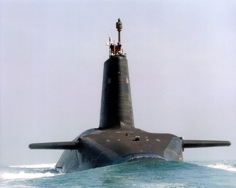Speaking in Delhi last week, George Osborne rejected calls from defence secretary Liam Fox for £20bn to replace the UK’s fleet of nuclear missile submarines.
While Fox has previously stated those costs should be provided by the Treasury because continuous at-sea defence is a matter of national security, Osborne said funding for Trident would be covered entirely by Ministry of Defence’s (MoD) budget allowances.
Chris Brown, a professor of international relations at London School of Economics, told The Engineer that this will put severe financial constraints on its renewal programme.
‘I think the announcement is really interesting and to my mind this might be the beginning of the end for the Trident replacement,’ he said.
‘The reason I say this is as far as the vast majority of the military are concerned it’s not a weapons system it’s a political symbol…and they are saying it is bitterly unfair we have to pay for this as though it were a weapons system.’

The Vanguard-class submarines that carry the Trident missiles are due to begin the end of their working lives in the 2020s. Prime Minister David Cameron had given assurance during the campaign his government would maintain the UK’s nuclear deterrent.
BAE Systems and Rolls-Royce are among the contractors who would build the replacement vessels.
With funding only being provided from the MoD, defence analysts believe less expensive options to the Trident nuclear deterrent renewal programme will need to be considered.
Malcolm Chalmers, a fellow in British security policy at the Royal United Services Institute for Defence and Security Studies (RUSI) suggested possible savings could be made by extending the Vanguard-class submarines and delaying the start of peak spending on the renewal programme until at least 2019.
In his paper ‘Continuous At-Sea Deterrence (CASD): Costs and Alternatives,’ Chalmers called for redefining what is meant by ’CASD’ to cut the fleet of boats from four to three.
Alternatively the fleet could be halved to two submarines by abandoning CASD in normal circumstances and delaying peak spending on the renewal programme until 2023.
Chalmers proposed another alternative using a ‘dual-capable’ submarine force that could fulfil conventional or deterrent roles and eventually replace the Vanguard and Astute class submarines.
He also proffered ‘a more radical option’ that would abandon a submarine-based nuclear deterrent altogether and rely instead on a non-deployed arsenal toprovide deterrence of future nuclear attacks
But Brown said this idea might in the end prove to not be any less expensive and potentially dangerous. ‘I’m not sure I would want hundreds of nuclear-tipped cruise missiles lying around the countryside in RAF bases,’ he said. ‘It doesn’t strike me as an attractive option. Plus the fact you couldn’t guarantee they could be delivered in time.’
While unsure which direction the UK nuclear deterrent programme will go, Brown said the recent public clash between Osborne and Fox on Trident’s funding will certainly spur the coalition government to seriously consider the issue. ‘I think we could have quite exciting political debates going on,’ he said.
Ben Zala, of the global security think tank Oxford Research Group, said the split in the cabinet over Trident could lead to risky deferral on the decision over its future.
’If you defer for a certain amount of time you are increasing the likelhood of things going wrong with the submarines that are out there at the moment,’ he said. ’The longer you defer the decision the higher the risk goes in terms of, in this case, catastrophic failure. A deferral for maybe six months to a year is possible but it likely that in the next two parliaments a firm decision will be taken. It may be they defer it so it doesn’t fall within the current cuts for the autumn budgetary announcement and therefore would fall outside of the timing of the defence review as well.’
As to whether a renewal of the Trident programme is actually necessary, Zala said ’that’s the $50 billion question’ for politicians but suggested that nuclear weapons are unlikely to have a role to play in future UK conflicts. ’The conflicts we are likely to be engaged in in the next couple of decades are likely to be what is referred to as hybrid warfare,’ he said. ’It’s a mix of terrorism, insurgency and traditional warfare all together. This is a much more complex way of fighting where nuclear weapons hold no use and can hinder your ability to fight because of the budgetary constraints that possessing nuclear weapons…would impose.’




Red Bull makes hydrogen fuel cell play with AVL
Formula 1 is an anachronistic anomaly where its only cutting edge is in engine development. The rules prohibit any real innovation and there would be...